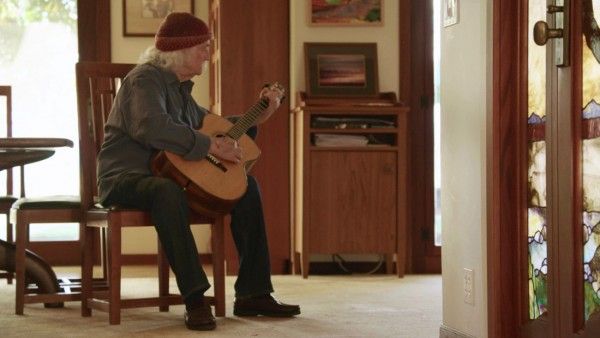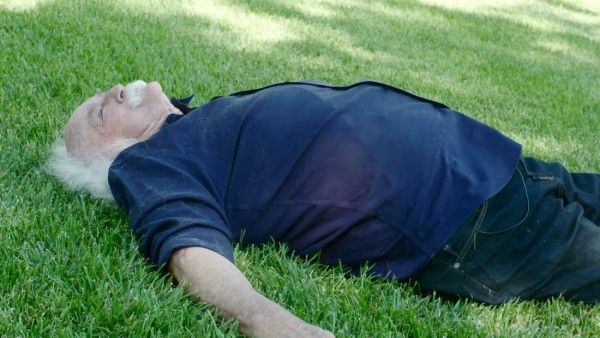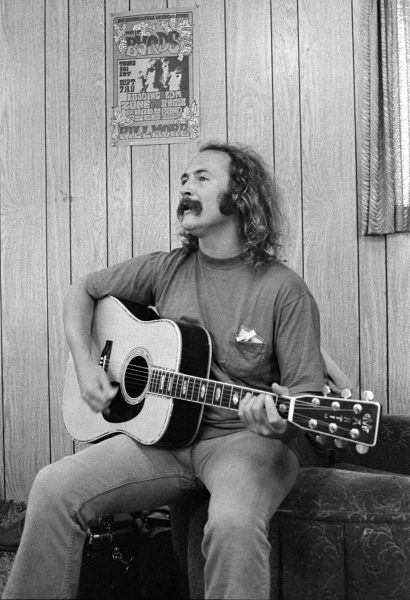Note: This is a re-post of our David Crosby: Remember My Name review from the 2019 Sundance Film Festival.
David Crosby should be dead. This is not an opinion or a wish, just a plain fact that the iconic rock star readily admits. He used heavy drugs (heroin and cocaine) for years, has had the maximum number of stints placed in his heart, and has diabetes. And yet, while many of his friends sadly passed away due to the unhinged lifestyle they too lived throughout the 70s and 80s, Crosby is still here after all these years at the age of 76, and he’s got some things to say.
The wildly compelling and surprisingly emotional documentary David Crosby: Remember My Name finds Crosby looking back on his life as his impending mortality encroaches, getting brutally honest with interviewer/producer Cameron Crowe about the many mistakes he’s made in the past, and why he can’t stop making music. It’s as candid a documentary about a “celebrity” personality as I’ve ever seen, and Crowe’s probing questions lead to genuine insights about the brevity of human life.
While Crowe serves as the producer and interviewer of David Crosby: Remember My Name, owing to his relationship with the musician that goes back four decades, the film hails from first-time director A.J. Eaton, who impresses from the first frame. There are intimate interview settings with Crosby to be sure, but in order to take viewers along the early years of Crosby’s life and the formative periods of his music career, Eaton follows Crosby with his cameras on a drive through Los Angeles, where Crosby will point out the real-life locations where important events occurred. They stop by a house that he shared with Joni Mitchell, and thus begins a recounting of their romantic relationship and the larger musical bond that formed among a variety of musicians at that time. They stop at a convenience store where pictures of famous residents hang on the walls, and Crosby takes a moment to point out how much he disliked Jim Morrison.
Indeed, Crosby is shockingly candid in Remember My Name. This is a man who admits up front that he doesn’t have much time left, should have died a long time ago, and absolutely is not ready to pass. But he’s also got nothing left to lose, so he reflects on his life with a self-confidence and awareness that is rarely seen not just in documentaries, but in human life. Crosby gets remorsefully personal about his many relationships, freely admitting he ruined the lives of many women both emotionally and by getting them addicted to drugs. Crosby also touches on his relationship with Christine Hinton, which is one of the most emotionally affecting moments of the film.
Crosby and Hinton were madly in love, but Hinton was killed in a car accident at the age of 21. Fellow Crosby, Stills, and Nash singer Graham Nash says that after Crosby had to identify the body, he was forever changed, never the same man. Crosby corroborates this in one of the most personal portions of the film, expressing deep regret at how he could have done more for Hinton and treated her better.
There is, of course, the music as well. The documentary is of a deeply personal nature and thus frames everything from the context of Crosby himself, so it doesn’t go album-by-album but instead hits the highlights of Crosby’s career, stopping to dig deep into seminal moments like the recording of the protest song “Ohio” by CSNY and how his political activism led to his firing from The Byrds. Take it from me: you do not have to be a diehard David Crosby fan to find this documentary unendingly compelling and emotionally affecting.
As Crosby reflects on his past life choices, including his addiction, recovery, and many breakups with Crosby, Stills, and Nash and Crosby, Stills, Nash and Young, he is shockingly candid and objective about the matters. Rarely does he throw other people under the bus and deny any blame or fault. He freely admits he’s a difficult person to get along with, speaks openly about these important relationships and how losing them has taken its toll on him. But because he’s so candid, when he stands his ground and defends his actions on something, you’re inclined to believe him.
In being so honest, Crosby touches on something universal. We all make poor choices in life. We feel invincible, treat others poorly, or take everything for granted. And when we get to the end of the road, it’s nearly impossible not to feel any regret. But Crosby speaks strongly about how much he regrets losing so many years to being addicted to drugs, and seems to be stressing the importance of living life well for as long as humanly possible. It’s a touching notion, made all the more impactful by the open and genuine demeanor of Crosby in these interviews.
While the doc oddly ignores Crosby’s relationship with his children, there’s more than enough here to delight longtime fans of the singer. But you also don’t have to be a fan to find David Crosby: Remember My Name insightful or edifying. Life is, after all, universal. And while the specifics may vary wildly, Crosby’s candid cataloguing of his emotions—thanks in part to terrific interviews by Crowe and Eaton—contains a multitude of life lessons that could be applied to anyone. That this also happens to be an insightful and compelling chronicle of an extraordinary man who lived an extraordinary life is a bonus.
Rating: A-





